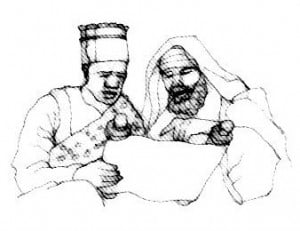Sabbath: Philip as Missionary
Read for This Week’s Study: 2 Cor. 4:18, Acts 2:44-47, Acts 4:34-37, Acts 6:1-7, Acts 8, Acts 21:7-10.
Memory Text:
(Acts 1:8 NIV).But you will receive power when the Holy Spirit comes on you; and you will be my witnesses in Jerusalem, and in all Judea and Samaria, and to the ends of the earth
World mission was the main concern of the risen Christ during the 40 days between His crucifixion and ascension.
The New Testament preserves at least five of His Great Commission statements: Matthew 28:18-20, Mark 16:15, Luke 24:47-49, John 20:21, Acts 1:5-8. Together they constitute the greatest assignment ever given to Christians. Among the commands was a geographical strategy for mission outreach, from its Jerusalem base to all Judea and Samaria, then ultimately to the ends of the earth. This was a command that they, indeed, took seriously and set out to fulfill.
This geographical strategy is prominent in the mission work of Philip the evangelist. According to Acts 8, his work extended outward from Jerusalem in expanding circles. That is, it kept spreading farther and farther as time progressed.
Who was this Philip the evangelist? What does the Word of God tell us about him and the work that he did during the earliest days of the church? Finally, what lessons can we take away for ourselves from the inspired record of this early missionary?
Study this week’s lesson to prepare for Sabbath, September 5.


The apostles, including Philip and the disciples in general of the early church had much in common, including persecution (2 Timothy 3:12). Jesus had told them before (Matthew 10:16 – 36) and so they were prepared. They understood beforehand they would need courage from the Holy Spirit and they prayed for it (Acts 4:29; Ephesians 6:19).
Persecution in part actually helped to spread the work and Philip took the message to Samaria, a place where there was no persecution initially.
Those who are commissioned with the task of taking the final warning message to the world ought to understand they too will need courage. It becomes the remnant people to pray for boldness if they are to preach undiluted truth; for they will be faced with stiff opposition, even within families and the household of faith (Luke 12:51-53).
While there are those who will be content to just say peace, peace (Jeremiah 6:14; 1 Thessalonians 5:3) the saints are given a strong message for good reason and ought not to shrink from it to gain favor or applause.
The faithful will face real and fake charges through various agents instigated by the accuser of the brethren (Revelation 12:10). If we cannot deal with light opposition (Jeremiah 12:5) there is little reason to believe we will stand in the final great test (Revelation 13:16).
Like Philip the faithful seek out the receptive (Matthew 10:14), but when confronted take courage and endure the preparation in whatever for it comes.
As long as the Lord has work for any He will send angels to shield and strengthen. And when the work is done He has something better in store (Hebrews 11:40).
Christ gave us an example and what he did became our road map and a manual for winning souls.The apostles followed Christ’s example. Then everything fall on its proper places. The key to success is prayerful life and walking through his footprints. Our lives, dedicated to His work is the powerful light that can turn vilest offender submit themselves to that light.
Let us move with the assurance that the Holy Spirit is with us as we go and share the gospel with our family, friends and even the enemies. Let the love of Christ shine in our heart.